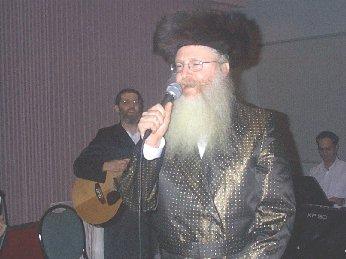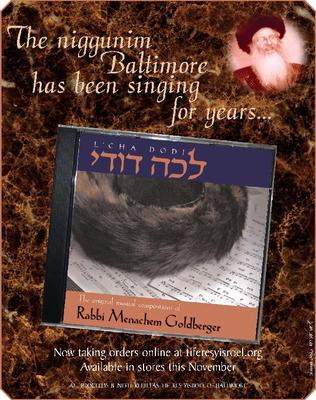Tuesday, September 27, 2005
 The following is excerpted and adapted from Denver's Intermountain Jewish News:
The following is excerpted and adapted from Denver's Intermountain Jewish News:
Rabbi Menachem Goldberger is the son of Rabbi Daniel and Ida Goldberger. He grew up on the East Side of Denver, where his father was the spiritual leader of Beth HaMedrash HaGadol-Beth Joseph (BMH-BJ) Synagogue, 1951-71. At that time, Menachem was one of the youngest members of the Beth Joseph men's choir. Later, Menachem Goldberger became a close disciple of the late Rabbi B.C. Shloime Twerski, the Hornesteipel Rebbe Zt"l, who founded the Talmudic Research Institute (TRI). In 1987, Rabbi Menachem Goldberger and his wife Bracha, a Denver native who attended Beth Jacob High School, moved to the East Coast and founded the now thriving Tiferes Yisroel congregation in Baltimore.
Rabbi Goldberger’s appearance is like an old-world Chassidic rebbe, complete with a long white beard (he is only in his 40s), long black satin cloak and round fur hat [shtreimel]. A composer of liturgical songs and melodies (niggunim), when he davens the Kabbalas Shabbos service, Rabbi Goldberger often uses an original, stirring melody for Lecha Dodi, the traditional prayer sung to welcome the Sabbath -- a melody now sung around the world. Rabbi Goldberger's strong yet delicate, melodious voice goes beautifully with that mesmerizing tune, which can set the mood for Shabbos.
One Motzaei Shabbos in Denver, BMH-BJ hosted a Melave Malka, a traditional, festive post-Shabbos meal, symbolic of escorting out the "Sabbath queen," while clinging to the warm, sweet feelings of Shabbos for just a little while longer. Especially touching was the presence of Rabbi Daniel and Ida Goldberger, who beamed with pride as they sat in the front row during a concert by their son Menachem. In fact, at one point, after the younger Rabbi Goldberger led the audience in singing his Lecha Dodi melody, his mother Ida stood up, took the microphone and proclaimed to the audience: "He's too modest. I just want you to know -- he wrote that himself!"

Indeed, Lecha Dodi is the title of Rabbi Menachem Goldberger's CD, which I was privileged to obtain on a recent visit to Tzfas, Ir HaKodesh [the Holy City]. The album was issued in America last November [2004]. I originally had heard the Lecha Dodi tune on a trip to Baltimore in 1990 [and it's safe to say that it wasn't brand new then, either], so it's no hype -- these niggunim are ones that "Baltimore has been singing for years." The album is beautifully and professionally done, with full musical accompaniment and instrumentation, including a string quartet [violin, cello, viola and bass], piano & keyboards, guitars, mandolin and percussion.
Although consisting of fifteen tracks, there are several reprises or "revisits": Lecha Dodi, his "opus," is presented once in its entirety, and then as a "remix" with String Quartet and Piano; Mareh Kohen is sung once, then "revisited" instrumentally; Yehi Ratzon, a very moving piece reminiscent of Michael Shapiro's niggunim, is presented first with String Quartet and Flute, then sung Live; and the Yom Tov niggun, a lively tune composed for the Kaddish recited after the Yom Tov Musaf prayer, is sung once, and, as a finale of the album, done again Live. Another tune performed Live is Simchas Torah, with words in both English and Hebrew. This tune was dedicated, of course, to Rebbe B.C. Shloime Twerski Zt"l, the tzaddik of Denver and previous Hornesteipel Rebbe, whose yahrzeit is on Simchas Torah. [Rebbe Shloime Zt"l and his son, Rebbe Mordechai Dov Twerski Shlita, have composed several niggunim both separately and together, some of which can be found on a cassette issued in 1987, Heartwork. Reb Michel Twerski of Milwaukee's musical prowess is well-known.]
Indeed, the work of Rabbi Menachem Goldberger, and of course, Rebbe Mordechai Dov Ber Twerski Shlita [check out some of his latest music here], have now taken the music of Hornesteipel and the Twerski family one generation further! We hope that this is only the first of many more albums to come!
<< Home

